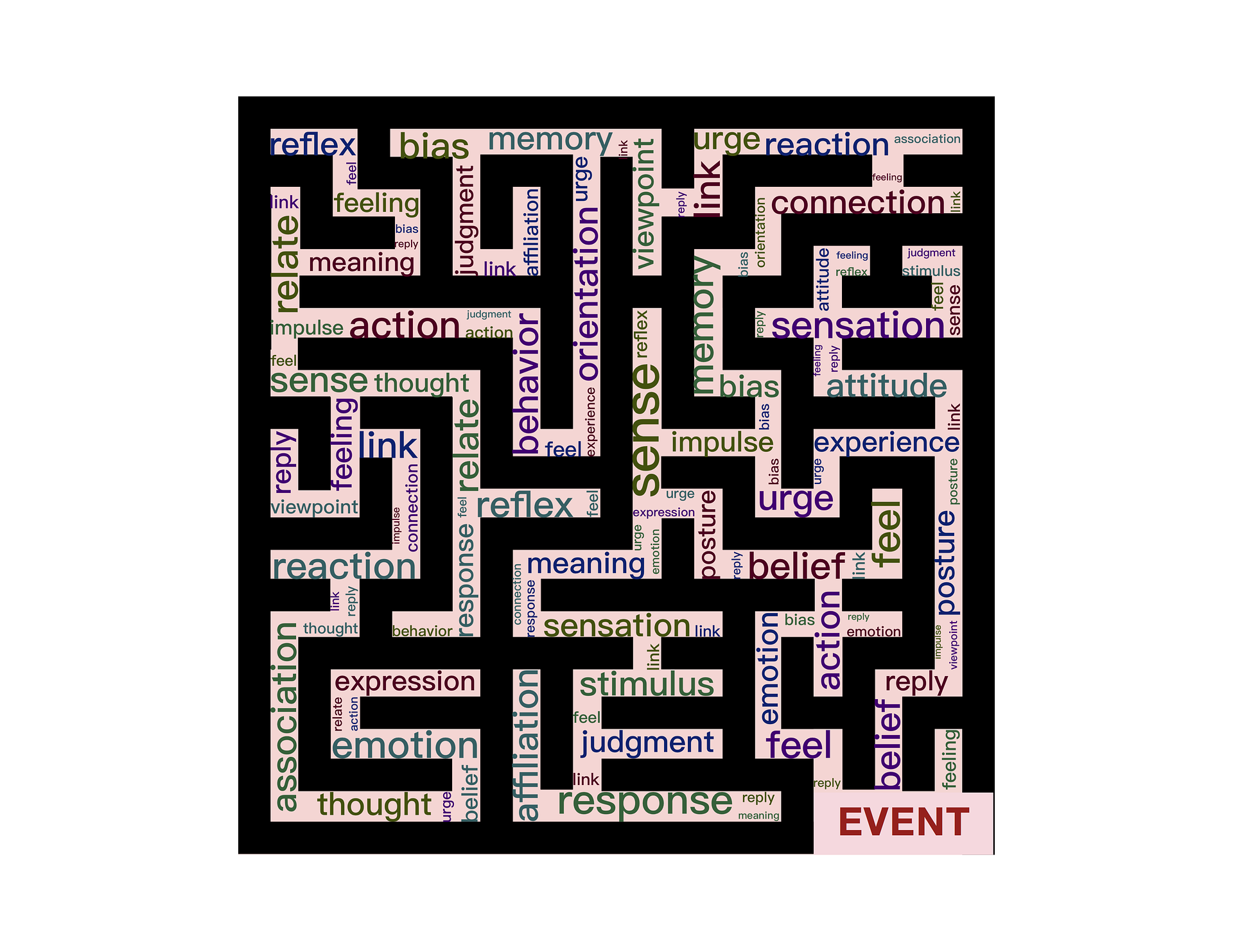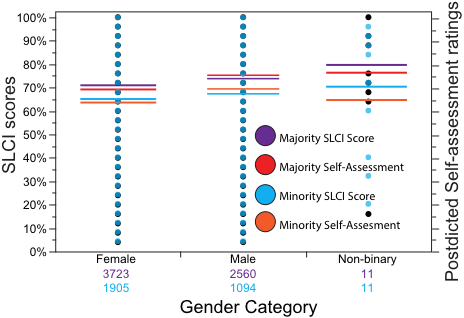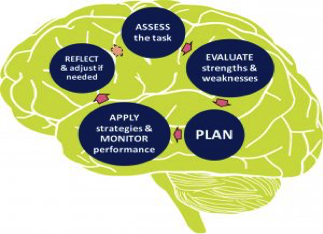by Kristen Chorba, PhD and Christopher Was, PhD, Kent State University
Several authors have noted that metacognition and executive functioning are descriptive of a similar phenomenon (see Fernandez-Duque, et al., 2000; Flavell, 1987; Livingston, 2003; Shimamura, 2000; Souchay & Insingrini, 2004). Many similarities can be seen between these two constructs: both regulate and evaluate cognitions, both are employed in problem solving, both are required for voluntary actions (as opposed to automatic responses), and more. Fernandez-Duque, et al. (2000) suggest that, despite their similarities, these two areas have not been explored together because of a divide between metacognitive researchers and cognitive neuroscientists; the metacognitive researchers have looked exclusively at metacognition, focusing on issues related to its development in children and its implications for education. They have preferred to conduct experiments in naturalistic settings, as a way to maximize the possibility that any information gained could have practical applications. Cognitive neuroscientists, on the other hand, have explored executive functioning using neuroimaging techniques, with the goal of linking them to brain structures. In the metacognitive literature, it has been noted metacognition occurs in the frontal cortex; this hypothesis has been evaluated in patients with memory disorders, and studies have noted that patients with frontal lobe damage, including some patients with amnesia, had difficulties performing metacognitive functions, including FOK judgments (Fernandez-Duque, et al., 2000; Janowsky, Shimamura, & Squire, 1989; Shimamura & Squire, 1986; as cited in Shimamura, 2000). Additionally, source monitoring and information retrieval has also been linked with the frontal cortex; source monitoring is an important metacognitive judgment (Shimamura, 2000). As previously stated, executive functions seem to be located generally in the frontal lobes, as well as specifically in other areas of the brain, contributing to the growing body of literature indicating that executive functions are both correlated and function independently. To explore the link between executive functioning and metacognition, Souchay and Isingrini (2004) carried out an experiment in which subjects were first asked to make evaluations on their own metacognition; they were then given a series of neurological tests to assess their executive functioning. They not only found a “significant partial correlation between metamemory control and executive functioning” (p. 89) but, after performing a hierarchical regression analysis, found that “age-related decline in metamemory control may be largely the result of executive limitations associated with aging” (p. 89).
As it relates to executive functioning, Fernandez-Duque, et al. (2008) noted that “the executive system modulates lower level schemas according to the subject’s intentions . . . [and that] without executive control, information processing loses flexibility and becomes increasingly bound to the external stimulus” (p. 289). These authors use the terms executive function and metacognition as essentially interchangeable, and note that these functions enable humans to “guide actions” where preestablished schema are not present and allow the individual to make decisions, select appropriate strategies, and successfully complete a task. Additionally, the primary task of both metacognition and executive functions are top-down strategies, which inform the lower level (i.e.: in metacognition, the object level; in executive functioning, as the construct which controls the “selection, activation, and manipulation of information in working memory” [Shimamura, 2000, p. 315]). Reviewing the similarities between metacognition and executive function, it seems that they are highly correlated constructs and perhaps share certain functions.
Executive functions and metacognition, while exhibiting similar functions and characteristics have, largely, been investigated along separate lines of research. Metacognitive research has focused on application and informing the teaching and learning processes. Executive functions, on the other hand, have primarily been researched as they relate to structures and locations within the brain. Recent literature and research indicates that executive functions and metacognition may be largely the same process.
References
Baddeley, A. (2005). Human Memory: Theory and Practice, Revised Edition. United Kingdom; Bath Press.
Blavier, A., Rouy, E., Nyssen, A., & DeKeyster, V. (2005). Prospective issues for error detection. Ergonomics, 7(10), 758-781.
Dinsmore, D., Alexander, P., & Loughlin, S. (2008). Focusing the conceptual lens on metacognition, self-regulation, and self-regulated learning. Educational psychology review, 20(4), 391-409.
Dunlosky, J., Metcalfe, J. (2008). Metacognition. Los Angeles: Sage.
Fernandez-Duque, D., Baird, J., Posner, M. (2000). Executive attention and metacognitive regulation. Consciousness and Cognition, 9, 288-307.
Flavell, J. (1987). Speculations about the nature and development of metacognition. In F. Weinert and R. H. Kluwe, (Eds.) Metacognition, Motivation, and Understanding. Hillsdale, NJ: Lawrence Erlbaum.
Friedman, N. P., Haberstick, B. C., Willcutt, E. G., Miyake, A., Young, S. E., Corley, R. P., & Hweitt, J. K. (2007). Greater attention problems during childhood predict poorer executive functioning in late adolescence. Psychological Science, 18(10), 893-900.
Friedman, N. P., Miyake, A., Young, S. E., DeFries, J. C., Corley, R. P., Hewitt, J. K. (2008). Individual differences in executive functions are almost entirely genetic in origin. Journal of Experimental Psychology, General, 137(2), 201-225.
Friedman, N. P., Miyake, Corley, R. P., Young, S. E., DeFries, J. C., & Hewitt, J. K. (2006). Not all executive functions are related to intelligence. Psychological Science, 17(2), 172-179.
Georghiades, P. (2004). From the general to the situated: Three decades of metacognition. research report. International Journal of Science Education, 26(3), 365-383.
Higham, P. A. & Gerrard, C. (2005). Not all errors are created equal: Metacognition and changing answers on multiple-choice tests. Canadian Journal of Experimental Psychology, 59(1), 28-34.
Keith, N. & Frese, M. (2005) Self-regulation in error management training: Emotion control and metacognition as mediators of performance effects. Journal of Applied Psychology, 90(4), 677-691.
Keith, N. & Frese, M. (2008). Effects of error management training: A meta-analysis. Journal of Applied Psychology, 93(1), 59-69.
Lajoie, S. (2008). Metacognition, self regulation, and self-regulated learning: A rose by any other name? Educational Psychology Review, 20(4), 469-475.
Livingston, J. A. (2003). Metacognition: An overview. Online ERIC Submission.
Miyake, A., Friedman, N. P., Emerson, M. J., Witzki, A. H., & Howenter, A. (2000). The unity and diversity of executive functions and their contributions to complex “frontal lobe” tasks: A latent variable analysis. Cognitive Psychology, 41, 49-100.
Nelson, T. O., & Narens, L. (1990). Metamemory: A theoretical framework and new
findings. In G. H. Bower (Ed.), The Psychology of Learning and Knowing. Cambridge, MIT Press, p. 1-26.
PP, N. (2008). Cognitions about cognitions: The theory of metacognition. Online ERIC Submission.
Shimamura, A. (2000). Toward a cognitive neuroscience of metacognition. Consciousness and Cognition, 9, 313-323.
Souchay, C., & Isingrini, M. (2004). Age related differences in metacognitive control: Role of executive functioning. Science Direct. 56(1), 89-99.
Thiede, K. W., & Dunlosky, J. (1994). Delaying students’ metacognitive monitoring improves their accuracy in predicting their recognition performance. Journal of educational psychology, 86(2), 290-302.
Winne, P. H., & Hadwin, A. F. (1998). Studying as self-regulated learning. In D. J. Hacker, J., Dunlosky, & A. Graessser (Eds.), Metacognition in educational theory and practice, (p. 277-304). Hillsdale, NJ: Lawrence Erlbaum.




